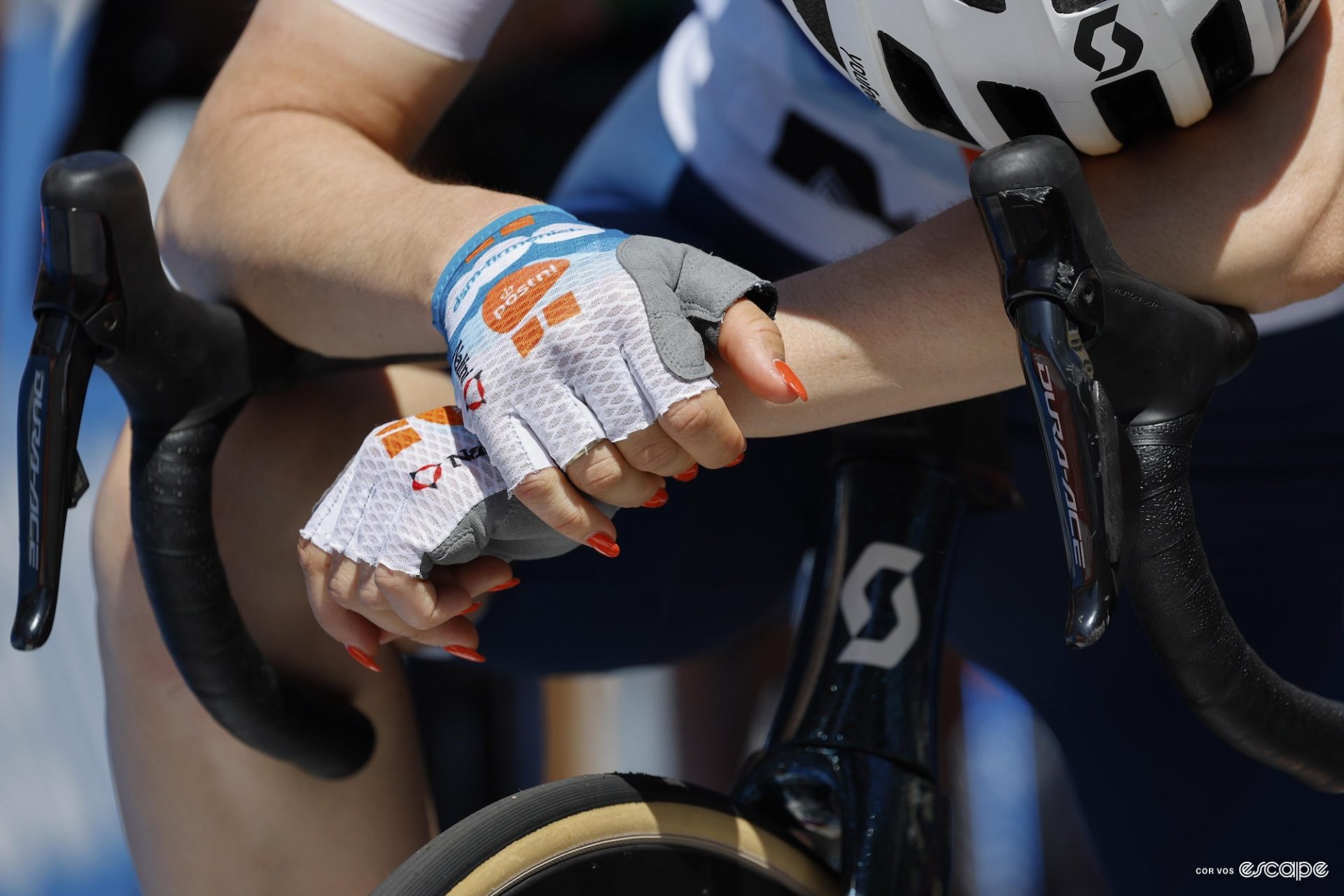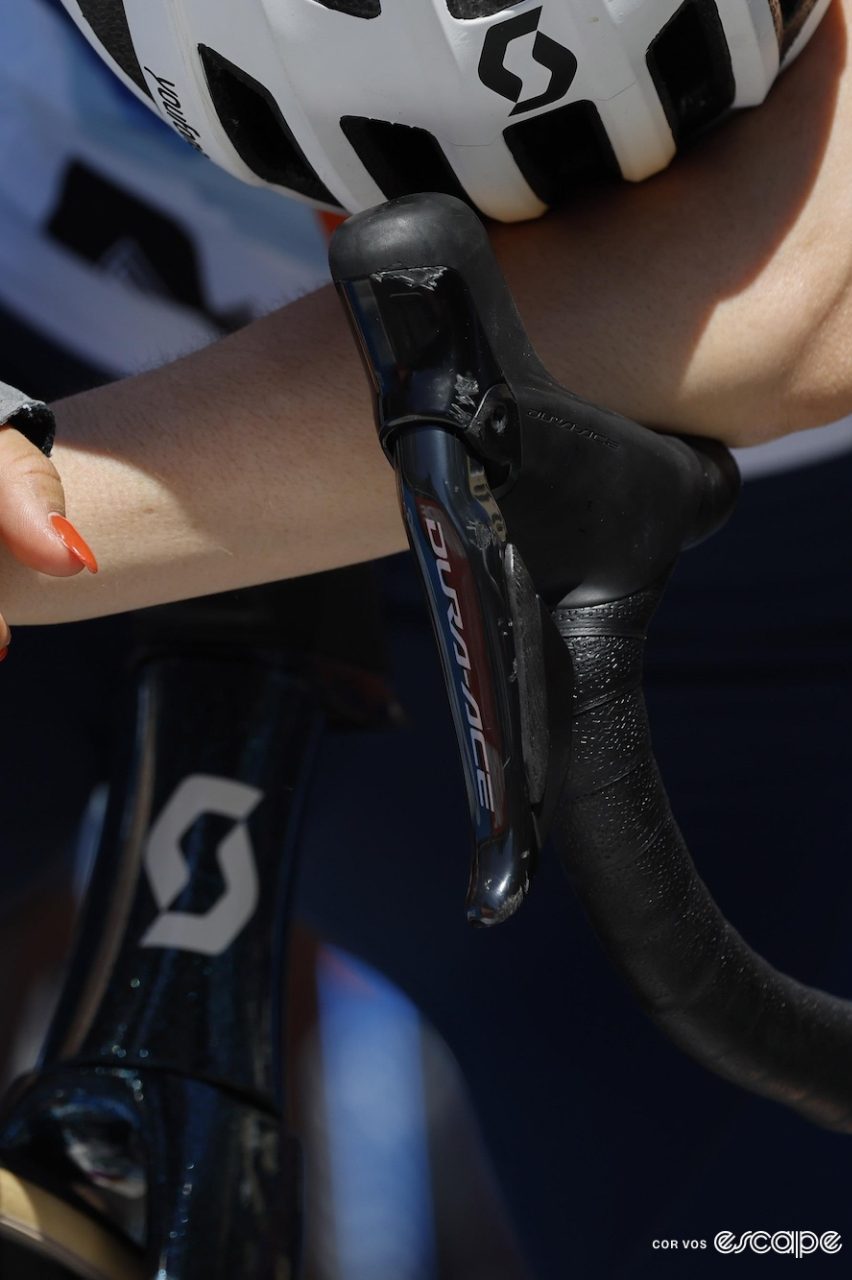Hello and thank you, as always, for opening this week’s Wheel Talk Newsletter. It will take me a while to recover from Sarah Gigante’s awe-inspiring performance on the final stage of the Tour Down Under. Not only because it was great to see the young Aussie back in the peloton, back at the front of the race, but also because of the raw emotion of the win. Gigante was open about what the victory meant to her, and Matt de Neef also had some other great coverage from the race you can find here if you missed it.
Before I dive into this week’s newsletter, a reminder that you can sign up to get this and Escape Collective’s other weekly publications straight to your inbox.
Last week on the Wheel Talk podcast I mentioned that Cecilie Uttrup Ludwig was primed to start the season the way she left it last year, on a high. Gracie predicted a victory for the Dane, so perhaps listeners weren’t surprised when she left the peloton in the dust in the finale of stage 2.
Uttrup was just one of the growing number of Europeans making their way south for the race. For the first five years of the event, it was part of the national race calendar, frequented by mostly Aussie riders, with the occasional European thrown in. Chloe Hosking won the inaugural race after two days of racing. By 2012 there were three stages and it was Germany’s Judith Arndt who took the overall (the only non-Aussie in the top 10). Two more European riders won the race before it became UCI-sanctioned. Loes Gunnewijk and Valentina Scandolara won in 2014 and 2015, but what followed as the race began to rise in ranking was a string of Australian victories (three of them Amanda Spratt) until Ruth Winder (now Edwards) took the overall in January 2020. It was the last edition before the race finally upgraded to WorldTour status (due to the pandemic it wasn’t held in 2021 or 2022).
Last year in its debut on the Women’s WorldTour the race remained a battle of the Aussies, with the overall coming down to Grace Brown and Amanda Spratt. But scroll through the start list and it’s obvious that something is shifting.
Especially as the race is now part of the WorldTour calendar and as it becomes more important to score those UCI points, teams are taking it a little more seriously. More European teams are making the trek down to Adelaide to compete. In 2023, six women’s WorldTeams attended – Jayco AlUla, Lidl–Trek, FDJ–Suez, Human Powered Health, Israel–Premier Tech–Roland, and EF Education–TIBCO–SVB. Three lower-level European teams joined the fray in St Michel–Mavic–Auber 93, Coop–Hitec Products, and Zaaf.
This year the race fielded an additional three WorldTour teams – four if you factor out the departure of the 2023 version of EF Education – in UAE Team ADQ, AG Insurance–Soudal, DSM Firmenich–PostNL, and Jumbo–Lease a Bike.
As each race becomes more important, each win more coveted, I expect we will continue to watch the start list for Tour Down Under and Cadel Evans Great Ocean Road Race, the one-day that takes place over a week post-TDU, grow. On top of the quest for points, it’s important also to recognize the hard work done by the race organizers to make it a race worth attending. The riders are not quiet about how well they’re treated, the viewers get start-to-finish coverage of each stage. Everything is so meticulously planned out, in large part thanks to the two former professionals assisting Stuart O’Grady in the organization of the event.
Annette (Nettie) Edmondson and Carlee Taylor have been instrumental in helping further the race appeal to the European teams whilst maintaining that Aussie feel. There are still home-town teams that line up against the top teams in Europe, which is massive for the continued growth of Australian cycling. With these two women helping pilot the ship we will see great things from the future of TDU.

?️ Wheel Talk Podcast ?️
At the Wheel Talk Podcast, we want to keep you all on your toes, so instead of me hosting a TDU-recap episode this week, we had Dave Rome, the guy with all the tools, hosting the podcast on the ground in Adelaide. He was joined by Wheel Talk’s own Gracie Elvin, who commentated on all three stages of the race, and Matt de Neef, who is covering the women’s and men’s events for Escape Collective.
I think Rome did an awesome job, but I missed dissecting the race, so I’ll join Caley and the gang for the Placeholders podcast this week and Gracie and I will be back next week to get you all ready for Cadel’s event (the Great Ocean Road Race), along with a special guest.
If you missed the on-the-ground TDU coverage you can find it on both the Wheel Talk Podcast feed and the Escape Universal feed.
? Let’s discuss ?
The average age of WorldTour teams.
There was a time, back before the formation of the Women’s WorldTour, when teams were required to have a certain average age. The rule trickled into women’s cycling from men’s Continental teams, which were required to trend lower in an attempt to focus on development.
The outcome was often that teams were forced to scout young riders to join the team just to bring down the average age. Loren Rowney has spoken on the Wheel Talk Podcast about how she was signed to Specialized Lululemon in 2012 as a young rider partially for this reason.
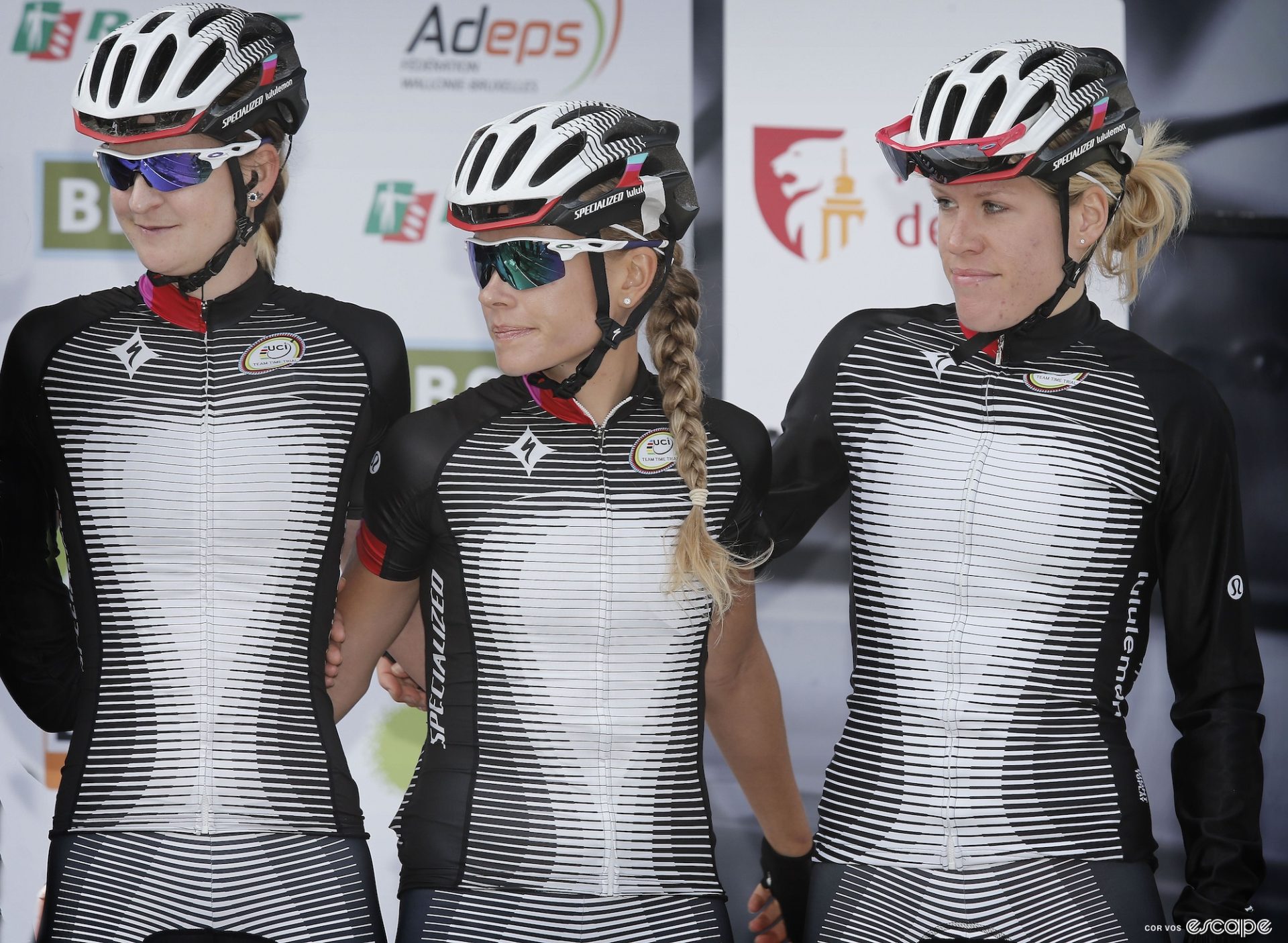
The UCI did away with this rule around 2013 but the average age of many teams remained roughly the same. This year the peloton as a whole is dipping downwards. Part of this is potentially due to a new boom in women’s cycling, with more young riders finding their way to the professional ranks, but another factor is that (like in men’s racing) women’s WorldTeams can pay neo-pros less.
In 2023, the minimum neo-pro salary on a WorldTeam, as set forth by the UCI, was €26,849 for an employed rider and €44,032 for a self-employed rider. In 2024 that amount will increase to €29,270 for employed and €47,986 for self-employed, and again in 2025 it will rise to €31,768 and €52,100. For comparison, a non-new rider’s required minimum salary this year is €35,000 for employed and €57,400 for self-employed. In 2024, that’s a €5,730 difference for an employee of the team and a €9,414 difference for a self-employed rider.
If we look at eight of the current WorldTeams in the bunch a few of them are picking up more and more young talent. Canyon-SRAM is probably the most dramatic shift. In 2014 (under Specialized Lululemon) the team’s average age was 26.6. Over the years that has steadily dropped to 25.2 when the WT was created to 24.5 this year. The team is brimming with young talent, with Ricarda Bauernfeind, Zoe Bäckstedt, and Antonia Niedermaier among them; all three were neo-pros last year, although Bäckstedt spent most of the season on EF Education.
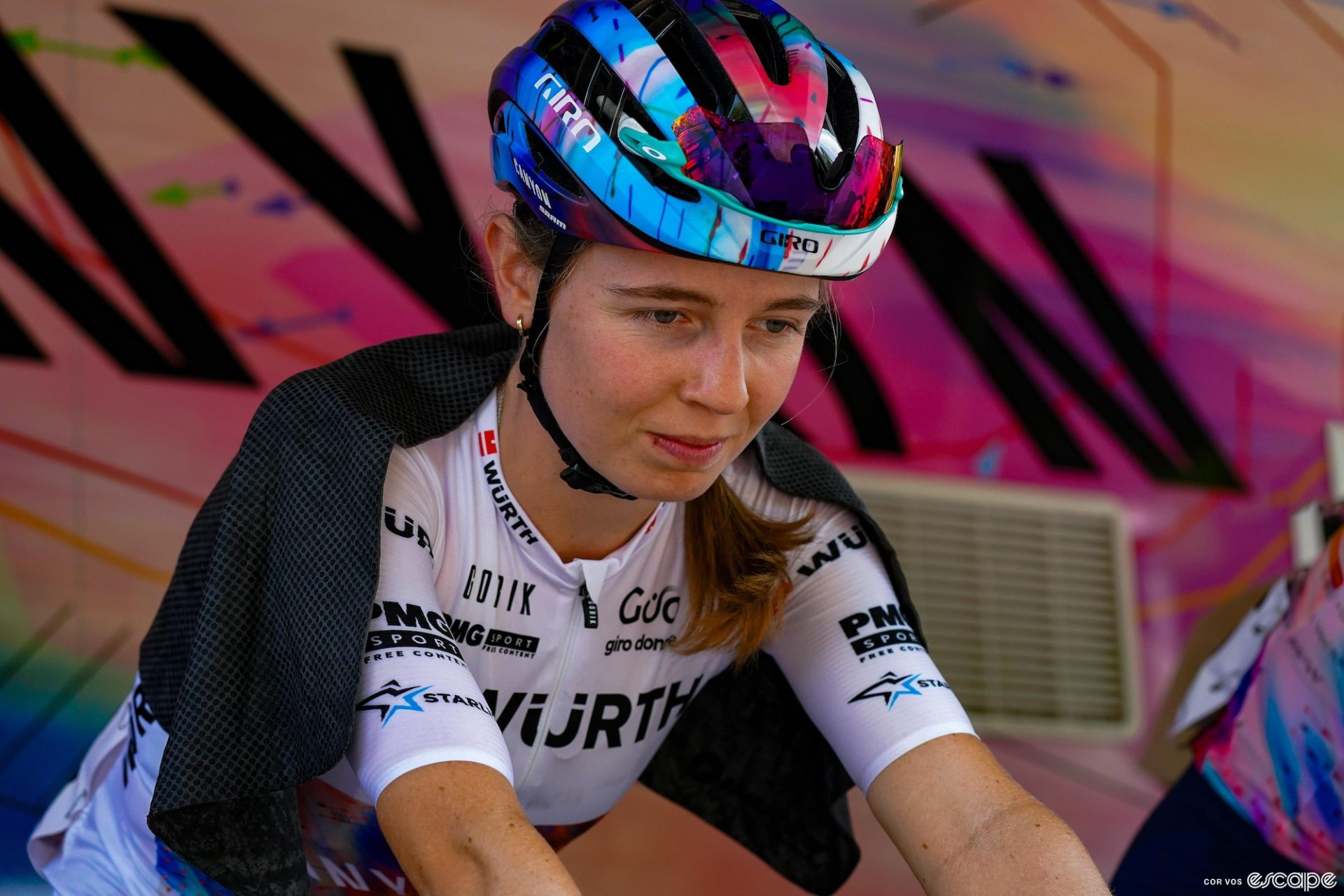
Similarly, DSM Firmenich–PostNL has also trended down, with an average age of 24.7 ten years ago, 23.1 in 2020 and this year only 22. For the 2024 season, the Dutch team signed two young talents. Josie Nelson, 21, out of Great Britain and Abi Smith, also 21 from Great Britain, who spent the last two years with EF Education-TIBCO-SVB. Only Nelson counts as a neo-pro this season, but last year, the team had five first-year WorldTour pros.
When Liv AlUla Jayco was Mitchelton-Scott back in 2014, the team’s average was 26.3, and it initially bucked the age trend by rising, in 2020, to 29.7. But since then it has once again dropped back down, and for 2024 the team’s average age sits at 26.7.
Then we have Lidl–Trek, who averaged out at 27.6 in 2020 but has an average age of 26 for the upcoming season. This is in large part due to the signing of not one, not three, but five riders under 19. The addition of Ava and Isabella Holmgren, Fleur Moors, Izzy Sharp, and Felicity Wilson-Haffenden – all of them 18-year-old neo-pros – helped the team’s average age of more than two years compared to last season’s 28.3.

Over the years there has been little change in SD Worx, formerly Boels-Dolmans. They consistently do what they do and don’t often factor into statistics.
Two teams have seen a jump in their team’s age. Both FDJ–Suez and Movistar went from 24.7 and 25.2 in 2020 to 25.6 and 26.9 this season. Both used to be devo teams of sorts, with FDJ–Suez focusing on young French talent and Movistar dedicating themselves to inspiring Spanish young women. But these two teams (in addition to Liv AlUla Jayco) are the teams that have gone from heavily national in roster makeup to pulling in riders from all kinds of nationalities (that is worth its own newsletter discussion).
Ok, so all of that is to say that on average we’re looking at a younger peloton in 2024. Not a lot younger, but the sport can scoop up more young talent into the WorldTour. Whether or not that is a good thing is also an entirely different discussion. The best takeaway here, I’ve said it before and I’ll say it again, the future of the sport is bright. We are seeing more young riders given the opportunity to learn and grow surrounded by legends of the sport, and as those legends depart the young riders now will carry on what they’ve learned for the next generation. With the increasing salary, both for experienced riders and neo-pros, the sport will continue to become more specialized, and perhaps there will be a handful of contenders for the 2026 Tour de France Femmes avec Zwift.
? The joys of social media ?
Speaking of future young stars! Ellen van Dijk had the most adorable fan while aero testing at the track in Valencia.

?️ A picture worth a couple words ?️
Cyclocross is not something I am well-versed in. During the winter months, after a long season following road racing, I prefer to turn my attention to my other love; cross-country skiing. But that doesn’t stop me from being inspired by the women who compete in the mud.
It looks like a fun sport, even with the cold and the mud and the blood and the tears. I mean just look at these two!
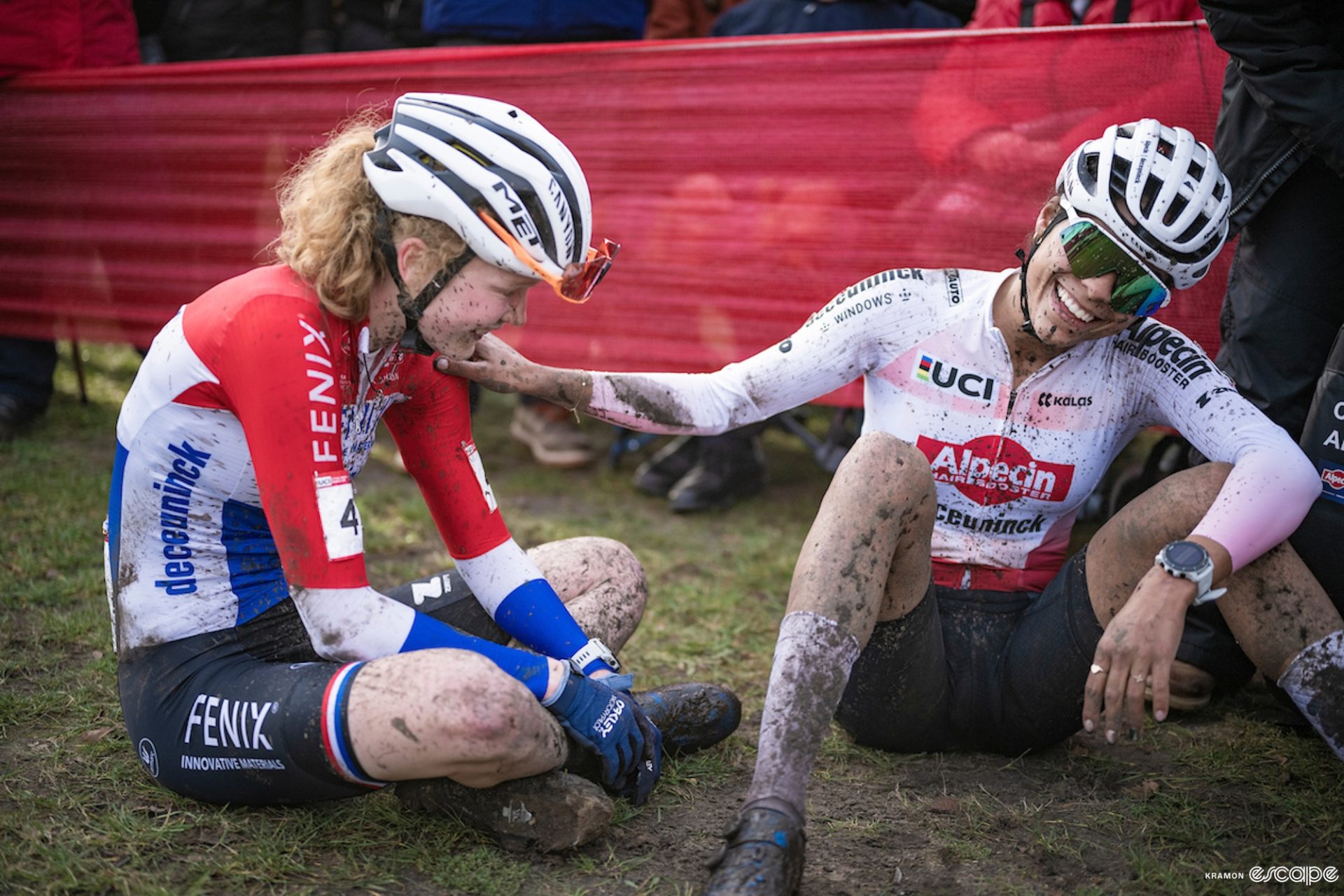
This photo was taken just after the World Cup in Hulst. Then-Dutch national champion Puck Pieterse took the win over her teammate Ceylin del Carmen Alvarado. What I love is the body language and the smiles from both riders, sitting in the dirt after the finish line, happy to be there and happy for each other.
? Taylor Swift trivia ?
Shortly after the revelation that Tour de France winner Tadej Pogacar is a Taylor Swift fan the cycling world was once again rocked last week. Ryan Mullen, multi-time Irish national champion on Bora–Hansgrohe, is also a “Swiftie.” Hopefully, it’s contagious, I would love to see Lidl–Trek rocking out to Shake It Off to amp themselves up before Omloop Het Niewusblad.
? Until next time! ?
Thanks so much for tuning into this week’s Wheel Talk newsletter! As always if you have a topic you’d like me to cover or dig into drop a comment below, or shoot me a message on the Escape Collective Discord. I love hearing from you all.
Did we do a good job with this story?
